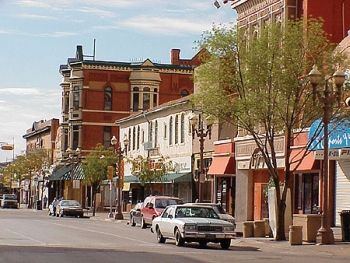
Publisher:
Bonnie King
CONTACT:
Newsroom@Salem-news.com
Advertising:
Adsales@Salem-news.com

~Truth~
~Justice~
~Peace~
TJP
Jun-18-2011 02:19

 TweetFollow @OregonNews
TweetFollow @OregonNews
El Grito de El Paso (The Cry of El Paso)
Kent Patterson for Salem-News.comDefending Mexican refugees has emerged as a big issue in El Paso and other places.
 Richard Arina |
(EL PASO) - On Memorial Day, Albuquerque resident Michael Brown embarked on a run of more than 260-miles to the US-Mexico border.
The long-distance runner began his marathon at the spot where the bodies of 11 murdered women were found on Albuquerque’s West Mesa back in February 2009. Headed south, the US Navy veteran stopped at a grave site to honor his fallen military brethren and then visited the Vietnam Veterans Memorial Park in Truth or Consequences, NM, a popular weekend getaway located about half-way between Albuquerque and El Paso.
In an interview with Frontera NorteSur, Brown said that a big purpose of his nearly two-week long trip was to raise awareness of youth violence as well as the failure of the juvenile justice system to deliver “real healing” and successfully reintegrate offenders back into the community. Brown’s concerns transcended national boundaries.
On Saturday, June 11, he stood with hundreds of other people in El Paso’s downtown plaza to take a stand against the violence flowing from the so-called drug war in neighboring Ciudad Juarez and beyond.
“That in fact does impact our families in New Mexico. Many of them cannot cross the border as easily to see their familia and vice-versa,” Brown said. “Everyone in southern New Mexico seems to know someone in Mexico that has been affected directly by the violence.”
Brown and many others were on hand to welcome members of the Caravan for Peace with Justice and Dignity that traveled through Mexico last week gathering victims’ testimonies and input for a citizen pact that demands an end to militarization of the drug war, a halt to criminal impunity, an emergency response to the youth crisis and a much greater dose of democracy.
Organized by Justice without Borders and other US groups, the El Paso event featured caravan organizer and Mexican poet Javier Sicilia and other speakers. In addition to the preliminary, six-point pact developed by Sicilia and other Mexican activists, the US groups agreed to three additional demands centered on this country’s relationship with Mexico.
 |
The three points included justice and protection for violence victims, immediate protection and asylum for Mexican refugees and an end to the Merida Initiative, the US-Mexico government agreement that provides US military hardware, training and intelligence to Mexican security forces widely accused of human rights abuses.
Ruben Garcia, director of the Annunciation House migrant shelter in El Paso, charged that Merida monies are being used to “suffocate the life of an entire country.”
From the podium, the names of local, regional and national US groups subscribing to the pact were read off to the crowd. The Border Network for Human Rights, Colonias Development Council, MECHA, Museo Urbano, and Miners without Borders were among the many adherents to the pact.
Defending Mexican refugees has emerged as a big issue in El Paso and other places. At the June 11 rally, El Paso immigration attorney Carlos Spector announced that Ciudad Juarez activist Cipriana Jurado’s petition for political asylum in the US was finally granted by a judge the previous day. The decision, Spector contended, represented an admission by the US government that the Mexican army is the “villain of the movie.”
A well-known labor, environmental and women’s rights activist, Jurado fled her home last year after helping file human rights complaints against the army and getting threats. A close associate of Jurado’s, Josefina Reyes, was murdered last year. Now a political exile, Jurado addressed the rally.
“We’re going to continue the struggle because we have that commitment,” Jurado said, running down the names of other Ciudad Juarez activists who have been murdered or forced to leave town like herself.
The former maquiladora worker then led the crowd in chants demanding the withdrawal of the Mexican army from Ciudad Juarez’s streets.
According to Spector, a committee of Mexicans-in-Exile will be unveiled in the coming days.
Like the caravan’s rallies in Ciudad Juarez and other Mexican cities, the El Paso event drew victims’ relatives with personal stories to share.
“Cesar Rico is Kidnapped.” Creel Asks for Justice,” read a pair of placards carried by a small group originally from the small mountain town of Creel, Chihuahua. Luz Rico, aunt of the kidnapped man, said the family still has no word of her nephew’s fate even after Mexican President Felipe Calderon was personally told of the case and the office of Chihuahua Governor Cesar Duarte likewise informed.
Since Cesar Rico’s November 2010 kidnapping, two members of the family of taxi drivers and car sellers have been murdered, according to Luz Rico and other relatives accompanying her. Irma Ramos, an in-law who was known for reporting suspicious activities to the Mexican army, was among the victims, they added.
“There is a lot of insecurity in Creel,” Rico said. “Kidnappings, death, all of that. It is very bad. They should pay attention to this town.” In 2008, Creel briefly made the news after 13 people-including an infant-were murdered in an attack on a party.
A once-quiet jumping-off point for the famed Copper Canyon tourist circuit, Creel and its environs have been selected by the Mexican government as the focal point for major tourist development.
Historically, the mountainous zone has been an important producer of marijuana and opium poppies. Clandestine air strips, drug shipment routes and illegal logging all add to the strategic value of the region.
 |
To varying degrees, Creel, Ciudad Juarez, El Paso and Albuquerque all constitute distinct yet connected “plazas” in a hyper-charged, transnational economy of illicit products, fast money, corruption, violence and addiction. In this casino-like world of high stakes gamblers, unlimited riches and power are the elusive wins and premature death the more likely outcome.
For nearly a century, Mexican-produced smack has cultivated a heroin culture in New Mexico’s largest city. Typically, the problem is swept under the rug by polite society but a recent surge in addictions and overdose deaths of Albuquerque teens attending the city’s best public schools has generated a blast of media coverage.
A youth advocate, Michael Brown works in training and professional development for the New Mexico Forum for Youth in Community. As part of his job, the former navy man visits young people in a substance abuse treatment center. Recently, he encountered an 8-year-old girl and a 9-year-old boy who became addicted to heroin after finding the drug left out in the open by adults “responsible” for their care.
“It just completely broke my heart,” Brown said.
Albuquerque’s heroin dreams and nightmares are just one piece of a larger youth crisis that’s also readily event in Ciudad Juarez, Mexico and, indeed, across the globe.
Everywhere youth unemployment is rampant, and in the Duke City it’s common to find scores of young people applying for a low-paid job cleaning tables or flipping burgers. Violence connected to gang, dating and domestic situations are constants. Nobody has been arrested for the murders of the young women found on the West Mesa, and similar to the impunity shrouding the disappeared of Ciudad Juarez, others remain missing with no word of their whereabouts.
Earlier this month, a young man, was shot and killed in front of other teens at a house party where a fight with gang overtones shattered the night.
“All this percolates and really becomes an epidemic in our society,” Brown said. “We really want to talk about the fact that our young people are our future. We’re late.”
For the military veteran, the solutions to cross-border violence will come from below, from the grassroots, where people should be pushing politicians instead of the other way around. “We talk about military resolve. I think we need community resolve,” Brown asserted.
The Albuquerque activist’s prescriptions find a lot of common ground with the Caravan for Peace and Justice with Dignity and its citizen pact, which stresses collective action on violence, the youth crisis and the renewal of civil society.
In El Paso, caravan co-organizer Julian LeBaron of Chihuahua spoke about the emergence of a “new people” rising up to sow dignity, honor and pride.” And in the case of his own country, LeBaron said the time for change was urgent:
“Mexico today trembles from the threat of violence. As a people, we’ve accepted this as a way of life but violence is not a way of life, it is a way of death. Our children hide like animals and don’t experience the beauty and abundance of our land and our traditions. Many of our brothers and sisters are ashamed of being Mexicans, and many flee their own country out of fear. The rest of the world watches and waits like vultures hovering over the corpse of a legendary beast. This has to stop. It is time.”
This article is part of a series, see:
Jun-16-2011: Love, Struggle and Memory in Ciudad Juarez - Kent Paterson for Salem-News.com
Frontera NorteSur: on-line, U.S.-Mexico border news
Center for Latin American and Border Studies
New Mexico State University
Las Cruces, New Mexico
Articles for June 17, 2011 | Articles for June 18, 2011 | Articles for June 19, 2011

Quick Links
DINING
Willamette UniversityGoudy Commons Cafe
Dine on the Queen
Willamette Queen Sternwheeler
MUST SEE SALEM
Oregon Capitol ToursCapitol History Gateway
Willamette River Ride
Willamette Queen Sternwheeler
Historic Home Tours:
Deepwood Museum
The Bush House
Gaiety Hollow Garden
AUCTIONS - APPRAISALS
Auction Masters & AppraisalsCONSTRUCTION SERVICES
Roofing and ContractingSheridan, Ore.
ONLINE SHOPPING
Special Occasion DressesAdvertise with Salem-News
Contact:AdSales@Salem-News.com

Salem-News.com:
googlec507860f6901db00.html

Terms of Service | Privacy Policy
All comments and messages are approved by people and self promotional links or unacceptable comments are denied.
[Return to Top]
©2025 Salem-News.com. All opinions expressed in this article are those of the author and do not necessarily reflect those of Salem-News.com.